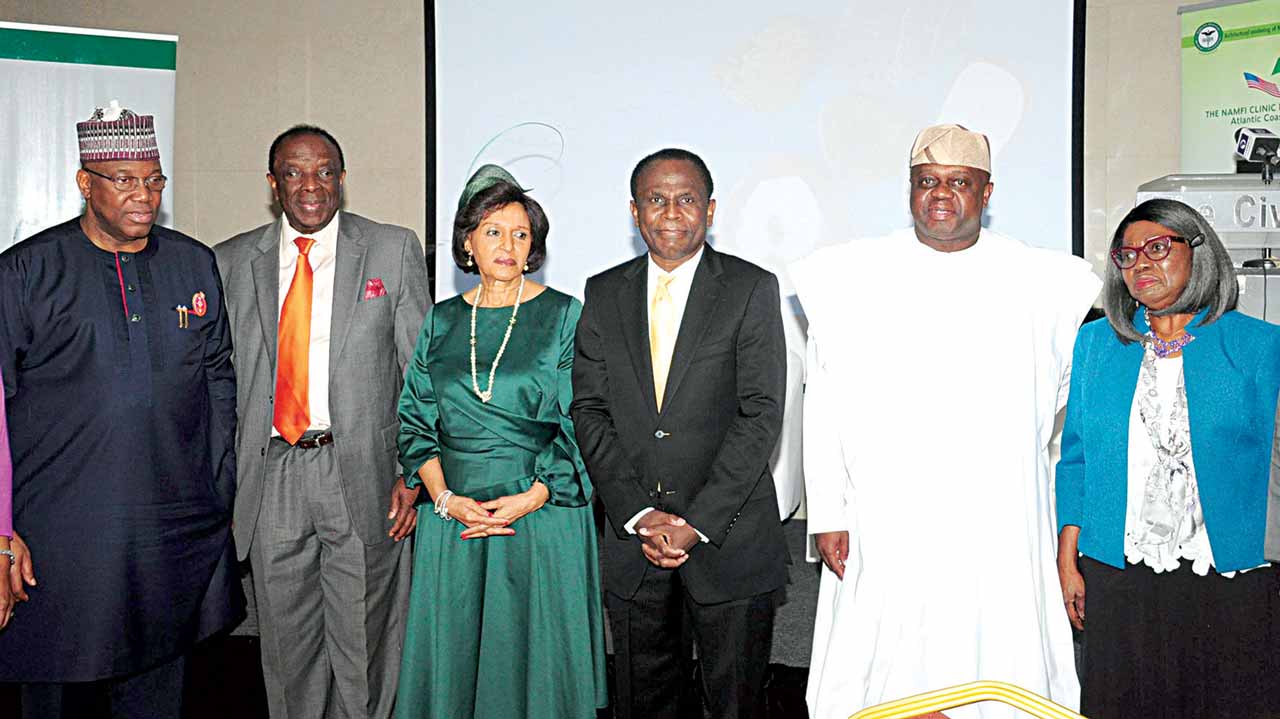Senate Committee on Health, Dr. Lanre Tejuoso, founder and Chief Medical Director of Eko Hospitals Ltd. Dr. Sonny Kuku, former Minister of Health, Dr. Adenike Grange, Vice Chair, NAMFI Board of Trustees (BoT), Dr. Adeyinka Shoroye harped on the need for Nigeria to address her Primary Healthcare System and the need for a very effective National Health Insurance Scheme (NHIS) to prevent the looming disaster.
Tejuoso, who spoke on ‘Legislative Agenda for the Health Sector of Nigeria’ said, “The problem of the health sector in Nigeria is too grave and it requires things to be done differently to get new success if we are going to have any in the industry.”
He said most of the topics discussed at the event only constitute about one per cent of the population of Nigerian “or I will say maximum of about two million out of about estimated 200 million Nigerians.”
The lawmaker lamented that Nigeria is really not concentrating on the basic things that are killing her population, saying, “In government today, the concern on paper is on this 198 million Nigerians living in the rural areas and the basic infrastructure they need is the Primary Health Centre (PHC) but unfortunately politicians concentrate on building structures, especially the infrastructure and the buildings which they intend to leave as a legacy by the time they leave office. Today, Nigeria has close 40, 000 structures as PHC with just about two to three thousand functioning. So you can imagine the number of scattered infrastructure called PHC in the country? Today, most of them are now used for poultry shelves, bakeries and so on.”
He also expressed concern over the rate at which trained doctors in Nigeria leave the country to the United Kingdom, United States and or Dubai in search of better opportunity just as he flayed the quality of education in the medical schools, describing as a “sorry state.”
According to him, “We trained them and they leave the country to go and support the health sector in other countries. If we withdraw our medical doctors (Nigerian doctors) in the U.K. today, their health sector will collapse. We are the one sustaining the health sectors of most foreign nations. We need to attract our doctors back to Nigeria not just to come and practice but also to come and train our doctors.
He also emphasised the need for Nigeria to have a functional PHCs.
He stressed: “The problem today is that people now go to tertiary hospitals for basic ailments like diarrhea, malaria and such minor ailments. Everybody now goes to teaching hospitals because our PHC are not functional.”
He decried the situation where Nigeria only sets aside five per cent of her annual budget for health as against the 15 per cent agreed upon by African countries at the Abuja Declaration held in 200.
“For any country to be successful in the health sector it must at least set aside 15 per cent of its budget for health,” he said. Countries that are not as rich Nigeria have achieved that 15 per cent and their countries are now our destinations for medical services. It has been confirmed that success in health is related to your finances. Nigeria, unfortunately called it Abuja Declaration; we are the least today. We haven’t surpassed five per cent ever since and even the five, maybe we will release three per cent but five on paper.”
Kuku, on his part, said Tejuoso simply postponed the evil day to 10 years because the health infrastructure virtually does not exist.
According to him, “Nigeria needs a very effective health insurance to prevent the looming disaster. This current NHIS came in 40 years ago but now we only cover two to three per cent. Ghana covers 70 per cent and Uganda 90 per cent. The monies for the NHIS are locked up in the banks.”
He also suggested the need for NHIS to serve as a regulator while the private sector should be allowed to run the insurance scheme like it is happening in the pension scheme.
“The people managing the NHIS should be health insurance people who are trained in the insurance health,” he said. “I believe if we get the insurance system right, we will have no more problem. Government can then just concentrate on PHCs.”
Professor Grange said there is the need for the country to take care of data without which it could not develop the health sector.
The foundation also felicitated with Publisher of The Guardian Group (TGG) and chair of NAMFI BoT, Lady Maiden Alex-Ibru, who celebrated her 70th anniversary birthday on Wednesday, November 20. The foundation also unveiled a statue after J.O.A Sodipo Memorial Statue in his honour. He was a former member of NAMFI board of trustees, a renowned physician, whose acupuncture practice was legendary.
source: Guardian

 Some groups of medical experts have said there is looming danger in Nigeria’s healthcare system if necessary and urgent steps are not taken to address it.
Some groups of medical experts have said there is looming danger in Nigeria’s healthcare system if necessary and urgent steps are not taken to address it.




